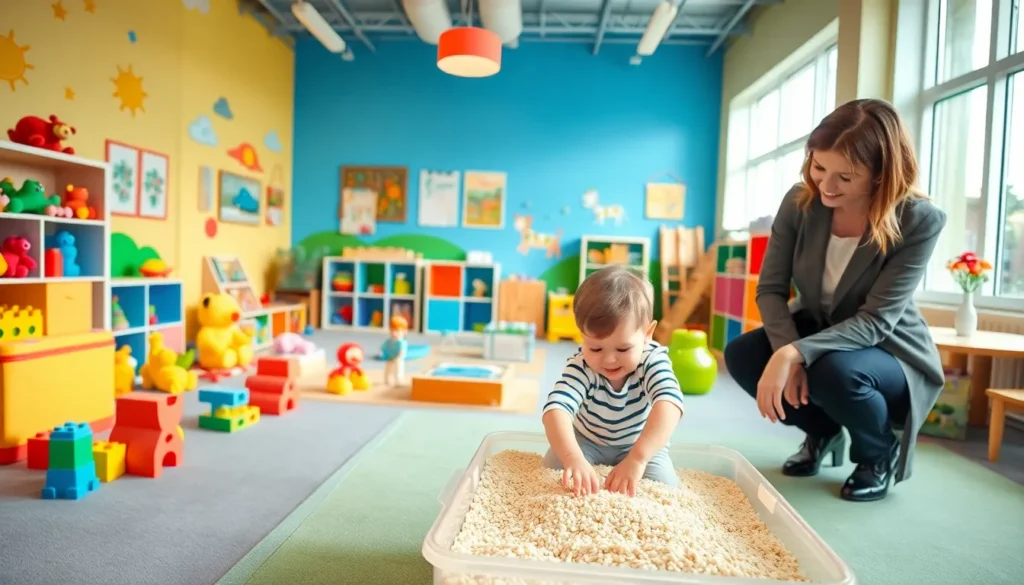In today’s digital age, toddlers are exposed to screens more than ever before. Parents often find themselves navigating the tricky waters of screen time, balancing the benefits of educational content with concerns about excessive exposure. With devices becoming a staple in everyday life, understanding the impact of screen time on young children is crucial.
Research shows that while certain screen activities can enhance learning and development, too much screen time can lead to negative effects on behavior and health. As parents strive to make informed decisions, it’s essential to explore guidelines and expert recommendations. By setting healthy boundaries, caregivers can help foster a balanced approach to technology that supports their child’s growth and well-being.
Table of Contents
ToggleUnderstanding Screen Time For Toddlers
Understanding the impact of screen time on toddlers involves recognizing both benefits and drawbacks. Educational content can enhance cognitive development, improve language skills, and foster creativity when used appropriately. However, excessive screen exposure correlates with attention issues, impaired social skills, and sleep disturbances.
Guidelines suggest limiting screen use for toddlers to one hour per day for children aged 2 to 5 years. Parents can enhance learning by choosing high-quality, age-appropriate programs that encourage interaction and engagement. Activities such as discussions about the content can maximize benefits while minimizing potential harms.
Balancing screen time with physical activity and social interactions is crucial. Engaging toddlers in hands-on experiences promotes healthier development. Encouraging outdoor play and creative activities lessens reliance on screens.
Parents should model healthy screen habits. Demonstrating appropriate screen use can instill positive behaviors in toddlers. Consistency in enforcing screen time limits not only reinforces guidelines but also encourages diverse experiences crucial for toddler growth.
Benefits Of Screen Time

Screen time for toddlers can offer distinct advantages when approached mindfully. Focused and intentional screen usage can enhance learning and development in various ways.
Educational Apps And Videos
Educational apps and videos provide interactive learning experiences that can strengthen cognitive skills. Engaging content in these formats often facilitates language acquisition and critical thinking. For instance, programs designed to teach numbers, letters, and problem-solving skills effectively combine entertainment with education. Numerous studies indicate that children who interact with educational screens demonstrate improved vocabulary and comprehension compared to those with limited exposure.
Social Interaction And Development
Screen time can also promote social interaction through shared viewing experiences or interactive games. Participating in group activities online encourages toddlers to engage in collaborative play, enhancing social skills. For example, video calls with family members can strengthen connections, fostering emotional development. Research shows that when children watch educational content together with parents or caregivers, they gain valuable opportunities for discussion and bonding, making screen time a potential tool for enhancing relational skills.
Risks Of Screen Time
Excessive screen time presents several risks for toddlers, affecting their health and development. Parents should understand these potential drawbacks to create a balanced approach to media consumption.
Impact On Sleep
Frequent screen exposure can disrupt toddlers’ sleep patterns. Research indicates that blue light emitted by screens interferes with melatonin production, making it harder for children to fall asleep. Reduced sleep quality leads to irritability and difficulty concentrating during the day. The American Academy of Pediatrics recommends avoiding screens at least one hour before bedtime to promote healthier sleep habits.
Effects On Behavior And Attention
Extended screen time correlates with behavioral issues and attention difficulties. Studies show that toddlers who engage in excessive screen use may exhibit increased aggression, irritability, and difficulty with impulse control. Furthermore, these children often face challenges in focusing on tasks, resulting in reduced academic readiness. Engaging with screens for prolonged periods limits time spent on activities that promote attention development, such as outdoor play and imaginative play. Establishing consistent screen time limits can mitigate these negative effects and foster healthier behavioral patterns.
Recommendations For Screen Time Limits
Establishing clear limits for screen time aids in optimizing the benefits while minimizing negative effects. Guidelines focus on age appropriateness and the quality of content consumed.
Age-Appropriate Guidelines
The American Academy of Pediatrics recommends specific screen time limits based on age. For toddlers aged 18-24 months, parents should introduce only high-quality, educational programs. For children aged 2 to 5 years, screen time should not exceed one hour per day. Parents are encouraged to watch content alongside children, fostering discussions that enhance understanding. For children younger than 18 months, screen time should be avoided, except for video chatting.
Quality Over Quantity
Quality of screen content plays a critical role in its impact. Parents should prioritize educational programs that promote active engagement, rather than passive consumption. High-quality content encourages interaction and stimulates learning, enhancing cognitive skills. Opt for interactive apps and videos designed for young audiences. Content that fosters creativity, problem-solving, and social understanding has lasting benefits, making choice vital in screen time practices.
Tips For Managing Screen Time
Managing screen time effectively contributes to a healthier childhood. Implementing strategies can help parents establish boundaries that promote development.
Creating Screen-Free Zones
Creating screen-free zones encourages alternative play and interaction. Designate areas in the home, such as bedrooms and dining spaces, where screens are not allowed. This practice fosters face-to-face communication and playtime, enhancing social skills. Parents can add books, puzzles, and toys to these spaces to encourage creative play. Making mealtime a screen-free time cultivates family bonding and promotes healthy eating habits.
Engaging Together During Screen Time
Engaging together during screen time enhances understanding and retention. Parents can watch programs alongside their toddlers, fostering real-time discussions about content. This interactive approach strengthens cognitive skills and aids in language development. Asking open-ended questions, such as “What do you think will happen next?” encourages critical thinking and involvement. Choosing educational content that sparks curiosity also makes screen time meaningful, promoting shared experiences that strengthen relationships.
Navigating screen time for toddlers is a delicate balance that requires thoughtful consideration. Parents play a crucial role in shaping their children’s experiences with technology. By prioritizing high-quality content and setting clear boundaries, they can ensure that screen time serves as a tool for growth rather than a hindrance.
Fostering interactive and educational viewing experiences not only enhances learning but also strengthens family bonds. Engaging with toddlers during screen time can lead to meaningful discussions that promote cognitive and language development. Ultimately, a mindful approach to screen usage can create a positive environment that supports healthy development and well-being for young children.




